May-06-18
 | | KEG: A wonderful game by Schlechter, an exceptionally fine player who is a strong candidate in my book for the most underrated player of all time. His talents went well beyond his (in itself remarkable) drawn match with Lasker in 1910. In this game with Mason, Schlechter reduced to an even endgame by move ten and then mercilessly outplayed his opponent. Schlechter did nothing flashy. He just played sparkling, logical chess and blew Mason (reputed to be one of the best endgame players of his era) off the board in a few deft strokes. To quote Tartakower-DuMont in their commentary on this game: "In this short but expressive [sic] game we can but admire the simplicity of means used by the victor. One might say that he uses no means at all, no stratagems or other refinements, and that he succeeds in overcoming all resistance by virtue of the law that 'one weakness begets another.' " 1. e4 e5
2. d4
The Centre Game. This game was played in Round 16 (the penultimate round) of the Paris 1900 Tournament. Mason was having a dismal tournament, and may have hoped for some quick exchanges and a short and painless draw with the player often known as the "Drawing Master." If that was his intention, it proved misguided. Schlechter may have only had seven points going into this game, but that in part was because: (a) he had an earlier bye round; and (b) he had two draws that--under the rules in effect at Paris 1900--had to be replayed. Thus, Schlechter still had a chance at a prize (he wound up tied for seventh place, and might have finished higher if not for a poor game he played the following day against Mieses). 2... exd4
3. Qxd4 Nc6
4. Qe3 Nf6
5. Be2
5. Nc3 or the hyper-aggressive 5. e5, are more frequently played here. Perhaps the best move is 5. Bd3. The text is weak, as Schlechter quickly demonstrates, the position now being: 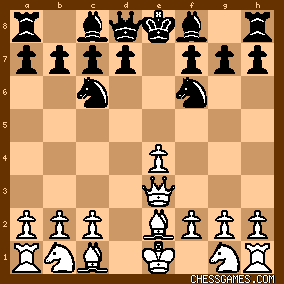
click for larger view5... Qe7!
"Well countered! Black not only prevents 6. e5 but is now attacking the hostile e-pawn." (Tartakower-DuMont). 6. Nc3 d5!
"Opening up the game." (Tartakower-DuMont)
7. exd5 Nb4!
A pretty move that secures a clear advantage for Black. 8. Bd1
A sad position for the White Bishop. The alternative, 8. Bd1, was not much better. The position after 8.Bd3 reveals just how thoroughly Schlechter had outplayed Mason to this point: 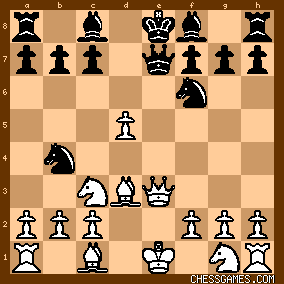
click for larger viewWith 8...NxB+, Schlechter could have enjoyed (as Black!) a considerable advantage as early as move eight. But here, Schlechter made his one (and only in my view) poor move in this game which gave away nearly all of his edge: 8... Nfxd5
This allowed Mason to reduce to an approximately even ending. 9. NxN NxN
10. QxQ+ BxQ
This left:
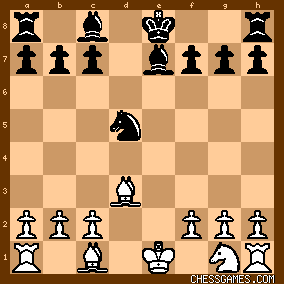
click for larger viewAccording to Tartakower-DuMont": "In this simplified position, Black has a small but distinct advantage in development." But if such is the case, I fail to see it. The endgame looks even and drawish to me. However, from this point, Schlechter overwhelmed Mason, and probably had a won game by about move 12. Needless to say, part of the reason for this shift in fortunes was some very poor play by Mason. But part of what makes up a great player is the ability to seize on even small errors by an opponent. How Schlechter accomplished this here will be covered in my next post on this game. |
|
May-06-18
 | | fredthebear: <KEG: A wonderful game by Schlechter, an exceptionally fine player who is a strong candidate in my book for the most underrated player of all time.> I agree that Schlechter is way underrated. (It could be a lengthy list though, depending upon the era.) He was oh so close to being world chess champion. I put Schlechter ahead of the likes of the better known Chigorin, Tarrasch, Marshall, Spielmann, Reti, Tartakower, Nimzowitsch, etc. Perhaps Schlechter is on-par with Paul Keres for being underrated, but Paul Keres is not forgotten so. The horrible World Wars affected so many international chess players negatively. Thank you for the game notes. The Center game is revived now and then. |
|
May-06-18
 | | fredthebear: After 10...Bxe7 it's a case of more rapid development for Black ("count the pieces" as Larry Evans used to say) to account for the edge over White. FTB dislikes retreating minor pieces to the back rank (and has missed such opportunities because of such an attitude). After 22.Bb2, the Horwitz Bishops face off. This is a rare sight that does not last long as one might expect.
Bernhard Horwitz (1807 in Neustrelitz – 1885) is an overshadowed player/writer who contributed much to German chess: Bernhard Horwitz |
|
May-06-18
 | | KEG: Post II
<fredthebear>The greatness of Paul Keres is of course beyond dispute. He was arguably the best player in the world over the course of 1952-1963, finishing tied for second in the 1953 Challenger's Tournament (behind Smyslov but tied with Bronstein and Reshevsky and ahead of Petrosian); second in the 1956 Challenger's Tournament (behind Smyslov again but ahead of Bronstein, Geller, Petrosian and Spassky); second to Tahl in the 1959 Challenger's Tournament (ahead of Petrosian, Smyslov, and Fischer) and missing first place even though he defeated Tahl 3-1 only because he lost two games to Fischer and one game to Benko whereas Tahl beat Fischer 4-0 and Benko 3.5-0.5; and second in the 1962 Challenger's Tournament to Petrosian ahead of Fischer, Korchnoi, and Tahl (who was ill) only because of losses to Fischer and Benko. My only reason for considering Schlechter the most under-rated is that just about every chess-player I know is familiar with the games and long and spectacular record of Paul Keres (e.g., AVRO 1938!) whereas Schlechter is generally only celebrated for his near-miss against Lasker, with people forgetting his otherwise fine record, which included ties for first at Munich 1900 [with Maroczy and Pillsbury and ahead of Burn, Marco, and Janowski]; Stockholm 1906 [with Ossip Bernstein]; Vienna 1908 [with Maroczy and Duras and ahead of Rubinstein, Spielmann and Marshall amongst others]; Prague 1908 [with Duras and ahead of Vidmar, Rubinstein, Maroczy, Marshall, Janowski, and Spielmann]; and won Hamburg 1910 outright (ahead of Duras, Nimzovitch, Spielmann, Marshall, Tarrasch, and a very young Alekhine), not to mention some very fine other finishes (e.g., second at Ostend 1907 a half-point behind Tarrasch and ahead of Janowski, Marshall, Burn, and Tchigorin); not to mention his crushing match victory over Janowski in 1902 (six to one); his tied match with Tarrasch in 1911; and his close call against Rubinstein in 1918 (in which--though probably seriously ill-- he lost by 2-1 with three draws at a time Rubinstein was near the top of his form). With regard to the position in the game against Mason after 10 moves, I agree that as of this moment Schlechter had two pieces developed while Mason had only one, but it was after all Mason's move, so I see no reason Mason could not have caught up in quick order. But on his eleventh turn, in the last diagrammed position in my last post, Mason played the very poor: 11. c4?
"This is the decisive mistake. White would have drawing chances with 11. c3." (Rosenthal in the Tournament Book). This comment is a gross overstatement. Mason was not reduced to seeking "drawing chances" before he made his eleventh move. I bet Magnus Carlsen would be playing to win if he had White here (and sucpect that Schlechter would have done the same against Mason with colors reversed). 11. c4? was indeed a lemon, and 11. c3 was surely better, though almost certainly not best. More apt was the comment by Tartakower-DuMont: "A weakening move which contributes nothing to White's development. The most suitable continuation was 11. Bd2." I agree that 11. Bd2 was a good move. It develops the Bishop, prevents Black's Nb4, and prepares for Queen-side castling if White wants and unbalanced end-game. Another possibility was 11. a3, which prevents Nb4, though it involves a slower developing process. By contrast, the text (11. c4?) develops nothing, creates needless weaknesses, and allows Black to seize the initiative. 11... Nb4!
Schlechter immediately seizes his chances.
12. Bb1?
What an awful move! Mason would have an inferior--though probably not hopeless--position with 12. Be4. With the Bishop retreat, Mason has managed to get all his pieces on his back-rank. 12... Be6!
The best way to exploit Mason's positional woes. The position was now:
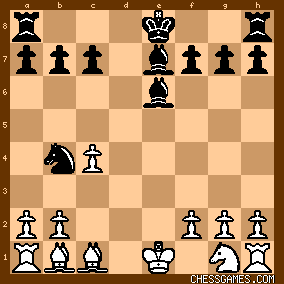
click for larger viewA comparison this position with that after 10...BxQ is striking. In just two moves, Mason had ruined his chances and Schlechter controlled the board. The way in which Schlechter went about converting what was by this stage a winning or nearly-winning edge will be discussed in my next post on this game. |
|
May-06-18
 | | KEG: Post III
From 12...Be6! on, it is instructive to see how Schlechter converts his advantage without giving Mason a glimmer of a chance to fight back. 13. a3
This creates new weaknesses, but this is inevitable. 13. Nf3 was the best alternative, but the Schechter would likely have played 13...0-0-0 with a significant and probably winning advantage (rather than 13...Bxc4 14. Ne5 allowing White some counterplay). 13... Nc6
14. Bf4?
Another weak move by Mason. 14. Bd3 would also have been bad (especially after 14...0-0-0). If 14. b3, then Tartakower-DuMont's suggested Nd4 would be crushing (and even better than Schlechter's proposed 14...a5, which also wins). Mason may have had some chances at resistanc with 14. Be4, 14. Nf3, or 14. Bd2, though prospects would still have been grim and Schlechter would almost certainly have won material in any case. The position was now:
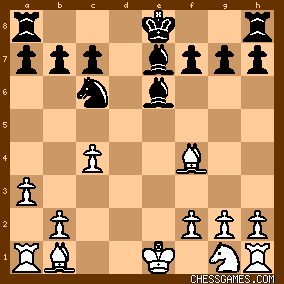
click for larger viewWhat a sad position for White after his 14th turn! 14... Bf6
Both this and 14...0-0-0 were very strong.
15. Ne2
Sadly for Mason, he probably had nothing better. If 15. Be4 Bxb2 (much better than 15...Bxc4 16. BxN+, though this line may also win for Black) 16. Ra2 (or 16. Rb1) Bc3+. 15... 0-0-0
This is even better than 15...Bxb2 16. Ra2 Bf6 17. Bxc7 Rc8 (stronger than Rosenthal's 17...Bxc4). Note how--at every stage of this ending--Schlechter chooses the continuation that prevents counterplay by Mason. 15...Na5 was another good option for Black.
16. Ba2?
After this listless move Mason's game is beyond salvage, as Schlechter promptly demonstrates. 16. Nc3 was Mason's only remaining chance at serious resistance, sad as that prospect would have been after 16...Na5. 16... Bxb2
17. Rb1
The position was now:
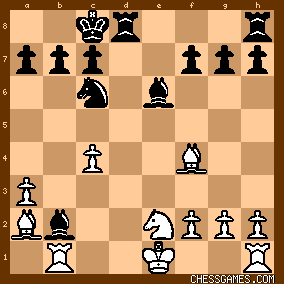
click for larger viewEvery computer will tell you that Schlechter should play 17...Bxa3 here and win a second pawn. But Schlechter instead played: 17... Bf6!!
I love this move. Why not just grab the pawn? Let's hear from Schlechter himself on this issue: "Of course, 17...Bxa3 also won. But the text move is stronger since it inhibits the development of White's game [by e.g., Nc3]." As Tartakower-DuMont noted, Schlechter's move allowed him "...to maintain his King's Bishop on the dominating diagonal." Thus, if you happen to be a computer, by all means play 17...Bxa3, secure in the knowledge that you can foresee every upcoming complication. If, however, you happen to be human, Schlechter's move seems clearly best, since you own the board, are up a pawn, and face no real threats. With due respect to our silicon friends, we can learn a good deal more from Schlechter than from computers in such positions. 18. 0-0 Nd4
18...Bf5 was also devastating.
19. NxN
Mason had apparently given up by this point. 19. Ng3 was the only even remotely possible way to breathe some life back into White's sorry position. 19... RxN
20. Be3 Rd3!
Another paralyzing move by Schlechter. Mason is not given the slightest chance (21. Bxa7 obviously loses to the killing fork: 21...Rxa3). The position was now:
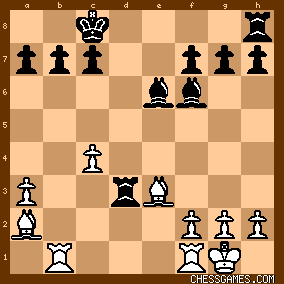
click for larger viewThe manner in which Schlechter finished off this game will be discussed in my next post. |
|
May-06-18
 | | KEG: Post IV
Schlechter's method of completing the game is--like what preceded it--marked by iron logic and wonderful simplicity. All means of counterplay for Mason are eliminated. 21. Bc1
The alternative, 21. Bb3, is also not pleasant for White. 21... Rhd8
Schlechter brings his final piece into the game with devastating effect. 22. Bb2
This is utterly hopeless, and allows Schlechter to create mating threats. 22. h3 might have allowed Mason to hold on a trifle longer. 22... BxB
Schlechter simplifies the position and wins a pawn. 23. RxB Rxa3

click for larger viewMason could safely have resigned here. But he tries one final attempt to attack, allowing us to admire the ease and beauty of the manner Schlechter chooses to employ to brush aside this final desperate effort by Mason. 24. Rfb1?!
A threat by Mason at last? Not hardly, as Schlechter quickly shows. 24... Rad3!
"He threatens mate and allows his opponent no counter-chances." (Tartakower-DuMont). Computers here play 24...b6 or 24...Rd4, and these also win. But Schlechter's move is prettier, and extinguishes all resistance. 25. Bb3
This only hastens his defeat. But the "better" 25. Kfi or 25. g3, though both avoiding immediate mate, were also of no use. 25... Rd2!
Computers here play 25...b6 or 25...R8d4. But Schlechter's move is just as crushing and simplifies what little is left of his task. 26. Bc2
This allows Schlechter to finish with a neat final combination. But the alternatives 26. Kf1 or 26. RxR also held out no hope. The position was now:
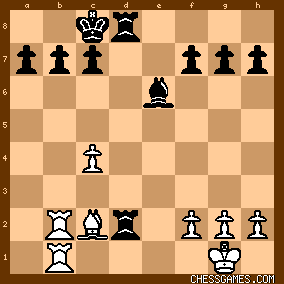
click for larger viewComputers here play 26...R8d4, and that is certainly a way to win. But any flesh and blood creature would prefer Schlechter's method: 26... RxB!
"Well-judged liquidation." (Tartakower-DuMont).
27. RxR Bf5
This left:
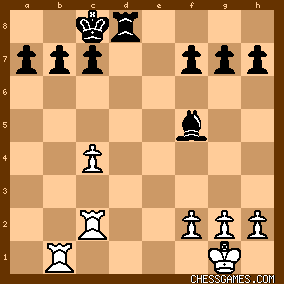
click for larger viewAs is obvious, Mason has no reason to play on.
0-1
A superb demonstration on how to exploit weaknesses by Schlechter. True, Mason's play was well below his usual standard. But whatever its warts, I love this game. |
|
| Dec-24-19 | | Whitehat1963: Schlecter makes this look like child’s play. He Humbled Humbled James Mason! |
|
|
|
|





